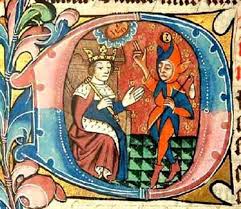 The title line of this post is taken from a Medieval manuscript called the Seven Sages, or in Middle English, the Sept Sages. The British Library website provides a detailed description of the extant copies of this work with fascinating information about its origins and how The Sept Sages was perceived by its original audience.
The title line of this post is taken from a Medieval manuscript called the Seven Sages, or in Middle English, the Sept Sages. The British Library website provides a detailed description of the extant copies of this work with fascinating information about its origins and how The Sept Sages was perceived by its original audience.
However, my focus today is on the term ‘folen feste’. The Middle English Dictionary provides only one definition for the term. “Fool’s day, a holiday observed on the first of January.” The Encyclopedia Britannica suggest that the Feast of Fools originated in the medieval English and Scottish holiday traditions surrounding the Lord of Misrule, who was appointed to manage the holiday “festivities held at court, in the houses of great noblemen . . .”
There are heated debates among scholars about how The Foles’ Feste might have become what we know now as April Fool’s Day. Some of the supposed explanations were in themselves foolishness. See the very erudite explanation provided by professor Joseph Boskin of Boston College. As amusing as this explanation is, because it sounds so very plausible, I am less concerned with this change of calendar than I am with the purpose of a Feast of Fools. In that respect, Prof. Boskin’s jest seems to me to have hit the proverbial nail. Boskin’s said, “it was a very serious day. In those times [ancient and medieval times] fools were really wise men. It was the role of jesters to put things in perspective with humor.”
Are you wise enough to be able to put your troubles into perspective with humor? Do you know someone who is? Please, leave a comment and tell us about this far from foolish aspect of your life.

Recent Comments